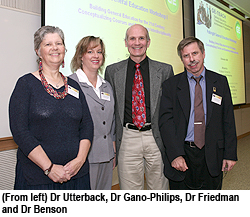CityU hosts Fulbright workshop to examine interdisciplinarity of GE courses
Building on previous discussion sessions that focused on GE outcomes, this workshop titled “Building General Education for the 21st Century: Conceptualising Courses and Examining Interdisciplinarity” was part of the Fulbright-Hong Kong General Education Project series of activities supported by the Office of the Vice-President (Undergraduate Education) and the Education Development Office of City University of Hong Kong (CityU). It is held in order to improve the ability of teaching and non-teaching staff to manage the transition from the three-year degree to four-year degree. Under the lengthened undergraduate degree structure, all CityU students from 2012 onwards will be required to take a suite of GE courses in order to gain a multi-disciplinary learning experience.
Professor Richard Ho Yan-ki, Provost of CityU, emphasised in his welcoming remarks the importance of a well-structured GE framework in broadening students’ horizons, cultivating their appreciation of cultural diversity and encouraging them to be lifelong learners. He advocated more thinking about how GE could help our future graduates understand the world and sharpen their edge in a world where trust is falling apart due in part to the global economic downturn. “Devising course content represents a challenge to educators. Besides talking about credit hours or the duration of GE, we have to think about what to cover, what is going to happen and what is to be done for GE,” Professor Ho said.
Dr Susan Gano-Philips, Associate Professor of Psychology in the College of Arts and Sciences at the University of Michigan - Flint, said GE was a good means of expanding students’ experience and preparing them for their future social, family and community roles. “GE programmes, when well developed and implemented, are equally as important as major studies,” she said.
Another Fulbright scholar Dr Kristine T. Utterback, Associate Professor of History at the University of Wyoming, said GE embraced integrative understanding and learning, which not only enabled teachers to work towards a common pedagogical goal beyond a single discipline but also encouraged students to view a question from multiple angles.
Dr Spencer A. Benson, Associate Professor in the Department of Cell Biology and Molecular Genetics in the College of Chemical and Life Sciences in the University Maryland - College Park, and Dr Stephen J. Friedman, Professor of Education at the University of Wisconsin - Whitewater, also attended the workshop and discussed the basics of GE course design, including techniques to identify common features and key implementation principles of GE programmes, design learning outcomes, activities, and assessments for a GE course, and examine the role of interdisciplinarity in GE programmes.
Another workshop focusing on assessment issues, as well as teaching and learning methods in GE programmes, will be held on 13 February 2009.
The Fulbright-Hong Kong General Education Project is administered by the Hong Kong-America Centre (HKAC), an organisation promoting understanding between Hong Kong and American societies through educational and cultural exchanges. It has long held inbound and outbound programmes for students and scholars from the US and Hong Kong to promote exchange between the two regions.

